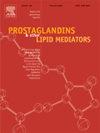IRGM在急性肺损伤中的作用:诱导线粒体自噬并使cGAS-STING信号失活以改善脂多糖诱导的肺泡上皮屏障功能障碍
IF 2.5
3区 生物学
Q3 BIOCHEMISTRY & MOLECULAR BIOLOGY
Prostaglandins & other lipid mediators
Pub Date : 2025-08-22
DOI:10.1016/j.prostaglandins.2025.107026
引用次数: 0
摘要
急性肺损伤(ALI)是一种常见的呼吸系统疾病,死亡率高。诱导线粒体自噬通常被认为是缓解ALI的有效靶点。我们旨在通过脂多糖(LPS)诱导的肺泡上皮细胞模型阐明免疫相关的GTPase M (IRGM)在ALI中的作用。首先,检测LPS条件下IRGM在A549细胞中的表达。然后,上调IRGM,并通过2 ',7 ' -二氯荧光素双醋酸酯(DCFH-DA)染色测定细胞内活性氧(ROS)来评估氧化应激。通过检测A549细胞上皮电阻值(TEER)和荧光素异硫氰酸酯-葡聚糖4 (FITC-FD4)荧光检测A549细胞的通透性。评估与上皮屏障、线粒体自噬和线粒体功能相关的蛋白。进一步研究Mdivi-1(一种线粒体自噬抑制剂)添加或环GMP-AMP合成酶(cGAS)-干扰素基因(STING)信号过表达刺激因子的潜在机制。结果表明,IRGM在lps处理的A549细胞中下调,IRGM上调可减轻lps诱导的A549细胞氧化应激、炎症和屏障功能障碍。在lps处理的A549细胞中,IRGM上调诱导线粒体自噬并维持线粒体功能。特别是,Mdivi-1处理或cGAS过表达消除了IRGM上调对lps处理的A549细胞氧化应激、炎症和屏障功能障碍的影响。总的来说,IRGM通过增强线粒体自噬使cGAS/STING信号失活来减弱lps触发的肺泡上皮细胞损伤。本文章由计算机程序翻译,如有差异,请以英文原文为准。
Role of IRGM in acute lung injury: Inducing mitophagy and inactivating cGAS-STING signaling to improve lipopolysaccharide-induced alveolar epithelial barrier dysfunction
Acute lung injury (ALI) is a common disorder of the respiratory system with high mortality. Inducing mitophagy is generally considered to be an effective target for alleviating ALI. We aimed to elucidate the role of immunity related GTPase M (IRGM) in ALI by using a lipopolysaccharide (LPS)-induced alveolar epithelial cell model. Firstly, IRGM expression in A549 cells under LPS conditions was evaluated. Then, IRGM was upregulated and oxidative stress was evaluated by measuring intracellular reactive oxygen species (ROS) using 2′, 7′-Dichlorofluorescin diacetate (DCFH-DA) staining. The permeability of A549 cells was determined by detecting transepithelial electrical resistance (TEER) value and fluorescein isothiocyanate-dextran 4 (FITC-FD4) fluorescence. Proteins related to epithelial barrier, mitophagy and mitochondrial function were assessed. Further Mdivi-1 (an inhibitor of mitophagy) addition or cyclic GMP-AMP synthase (cGAS)- stimulator of interferon genes (STING) signaling overexpression was conducted to investigate the potential mechanism. Results suggested that IRGM was downregulated in LPS-treated A549 cells and IRGM upregulation alleviated LPS-induced oxidative stress, inflammation and barrier dysfunction in A549 cells. IRGM upregulation induced mitophagy and maintains mitochondrial function in LPS-treated A549 cells. Particularly, Mdivi-1 treatment or cGAS overexpression abrogated the impacts of IRGM upregulation on oxidative stress, inflammation and barrier dysfunction in LPS-treated A549 cells. Collectively, IRGM attenuates LPS-triggered alveolar epithelial cell damage by enhancing mitophagy to inactivate cGAS/STING signaling.
求助全文
通过发布文献求助,成功后即可免费获取论文全文。
去求助
来源期刊

Prostaglandins & other lipid mediators
生物-生化与分子生物学
CiteScore
5.80
自引率
3.40%
发文量
49
审稿时长
2 months
期刊介绍:
Prostaglandins & Other Lipid Mediators is the original and foremost journal dealing with prostaglandins and related lipid mediator substances. It includes basic and clinical studies related to the pharmacology, physiology, pathology and biochemistry of lipid mediators.
Prostaglandins & Other Lipid Mediators invites reports of original research, mini-reviews, reviews, and methods articles in the basic and clinical aspects of all areas of lipid mediator research: cell biology, developmental biology, genetics, molecular biology, chemistry, biochemistry, physiology, pharmacology, endocrinology, biology, the medical sciences, and epidemiology.
Prostaglandins & Other Lipid Mediators also accepts proposals for special issue topics. The Editors will make every effort to advise authors of the decision on the submitted manuscript within 3-4 weeks of receipt.
 求助内容:
求助内容: 应助结果提醒方式:
应助结果提醒方式:


